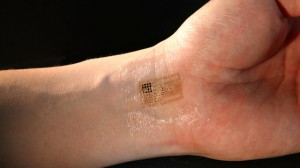Ebocloud is a science fiction that shows social singularity by projecting the social networking to a plausible extreme. In Ebocloud, there is a network in which the member are connected to each other not only by cyber space but more by physical-world interaction. The members are called “ebo cousins” and they are marked by “digital tattoo” which connects their minds to the network. In the network, members help each other to earn “Kar-merits” which show their influence. We can say that Ebocloud is a future-version Facebook with physical-world interaction. It is also this physical-world interaction that almost changes everything.
It seems cool at first glance to live with Ebocloud as everyone has a big “family” and many “ebo cousins”. But this collective consciousness leads to another kind of singularity without robots, or in other words, social singularity. The first creepy one about the social network in Ebocloud is privacy and individuality. We can be offline in Facebook easily by turning off our computer or just by throwing away our smart phone. But with a “digital tattoo” on one’s body, one’s mind is connected to the network all the time. This “digital tattoo” gets rid of the free mind of human. One’s mind is affected or even shaped by the collective consciousness all the time. One will never have his or her own free will. That makes human robots with collective consciousness. However, the “digital tattoo” is not very far from us with the development of digital technology. Scientists in Google even have succeed in making this creepy technology come to truth. So be careful when someone wants to make tattoo for you! The second horrible one about the network lies in the social relations between people. I think the negative effects on actual communication between people are obvious which have been discussed much in Facebook age. I want to use politics as an example. Let’s try to think about what politics will be with a physical-world interaction Facebook. The first scene comes to my mind is the world depicted in the novel Nineteen Eighty-Four by George Orwell. With “digital tattoo”, it would be much easier for “Big Brother” to control our minds. Some careerists such as Hitler may use this powerful network to control the innocent members to do nonhuman behaviors like terrorism. The world may again get into chaos.
Ebocloud depicts a world with social singularity. But it is more than social singularity. The book makes us think more about “if this is true, what else is true?”. So what is the next?
[1]Ebocloud, Rickmoss
[2]http://singularityhub.com/2011/02/07/ebocloud-a-novel-about-the-social-singularity/
[4]http://io9.com/5985558/temporary-tattoos-could-make-electronic-telepathy-and-telekinesis-possible
[5]http://www.cnn.com/2013/11/12/tech/innovation/google-throat-tattoo/index.html
[6]Nineteen Eighty-Four, George Orwell


